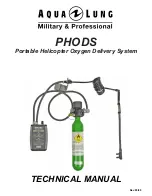
MC-II Flow Analyzer
Appendix C—Lithium Battery Information
Lithium Battery Disposal
Once a lithium battery is removed from a device and/or is destined for disposal, it is classified as solid waste
under EPA guidelines. Depleted lithium batteries are also considered to be hazardous waste because they meet
the definition of Reactivity, as per 40 CFR 261.23(a)(2), (3) and (5). This document describes how the lithium
reacts violently with water, forms potentially explosive mixtures with water, and when exposed to certain pH
conditions, generates toxic cyanide or sulfide gases.
Federal law requires that depleted lithium batteries be sent to a fully permitted Treatment, Storage and Dis-
posal Facility (TSDF) or to a permitted recycling/reclamation facility.
Important: Do not ship lithium batteries to Cameron’s Measurement Systems Division. Cameron facili-
ties are not permitted recycling/reclamation facilities.
Caution: Profiling and waste characterization procedures must be followed prior to shipping a
lithium battery to a disposal site. It is the shipper’s responsibility to comply with all applicable
federal transportation regulations (see below).
Transportation Information
Warning: The MC-III EXP flow analyzer contains lithium batteries. The internal component (thio-
nyl chloride) is hazardous under the criteria of the Federal OHSA Hazard Communication Stan-
dard 29 CFR 1920.1200. Before shipping a lithium battery or equipment containing a lithium
battery, verify that the packaging and labeling conforms with the latest version of all applicable
regulations.
The transport of the lithium batteries is regulated by the United Nations, “Model Regulations on Transport of
Dangerous Goods,” (special provisions 188, 230, and 310), latest revision.
Within the US the lithium batteries and cells are subject to shipping requirements under Part 49 of the Code
of Federal Regulations (49 CFR, Parts 171, 172, 173, and 175) of the US Hazardous Materials Regulations
(HMR), latest revision.
Shipping of lithium batteries in aircraft is regulated by the International Civil Aviation Organization (ICAO)
and the International Air Transport Association (IATA) requirements in Special Provisions A45, A88 and A99,
latest revision.
Shipping of lithium batteries on sea is regulated the International Maritime Dangerous Goods (IMDG) re-
quirements in special provisions 188, 230 and 310, latest revision.
Shipping of lithium batteries on road and rail is regulated by requirements in special provisions 188, 230 and
310, latest revision.
39
!
!
Содержание NuFlo MC-II
Страница 1: ...NUFLO MC II FlowAnalyzer User Manual Manual No 100079666 Rev OE ...
Страница 6: ...MC II Flow Analyzer 2 Figure 1 Nomenclature exterior ...
Страница 7: ...MC II Flow Analyzer 3 Figure 2 Nomenclature interior ...
Страница 32: ...MC II Flow Analyzer 28 ...
Страница 35: ...Figure A2 Field wiring for dry contact pulse output option non hazardous areas MC II Flow Analyzer 31 ...
Страница 36: ...32 Figure A3 Field wiring for open collector pulse output option non hazardous areas MC II Flow Analyzer ...
Страница 37: ...Figure A4 Field wiring for opto isolated pulse output option non hazardous areas MC II Flow Analyzer 33 ...
Страница 38: ...MC II Flow Analyzer 34 ...
Страница 44: ...40 MC II Flow Analyzer ...
Страница 45: ......
Страница 46: ......





































